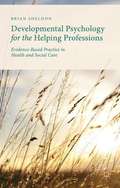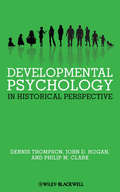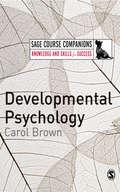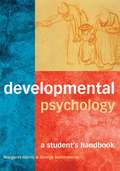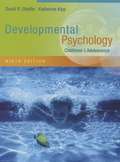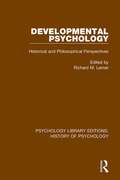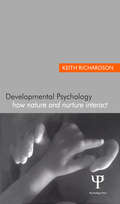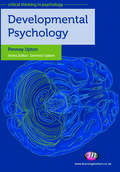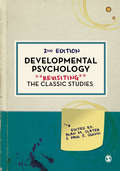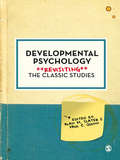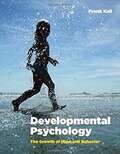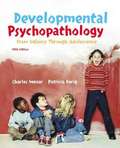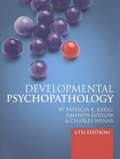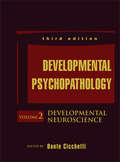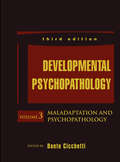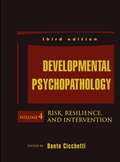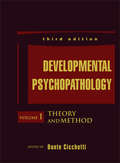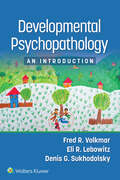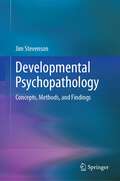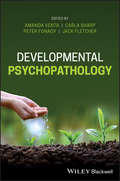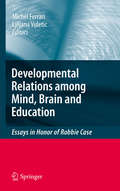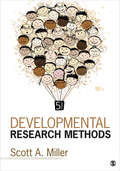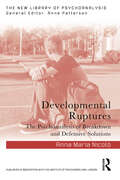- Table View
- List View
Developmental Psychology for the Helping Professions: Evidence-based Practice In Health And Social Care
by Brian SheldonThis book offers a bio-psycho-social approach to evidence-based practice in health and social care. The book presents current evidence on the influence of genetic, epigenetic and environmental factors on behaviour, a survey of developmental factors from childhood to old age, and implications for practice at each stage.
Developmental Psychology in Historical Perspective
by Dennis Thompson John D. Hogan Philip M. ClarkThis is the first book to provide a comprehensive overview of the history of developmental psychology, from the pre-scientific era to the present day. Covers the first research published in Germany, America, and France during the late 19th century Examines the work and influence of key international scholars in the area Incorporates the contributions of psychologists from diverse backgrounds Pays attention to the historical research on development in adulthood and old age Highlights the relationship between the growth of developmental psychology and renewed interest in child-rearing practices
Developmental Psychology: A Course Companion (SAGE Course Companions series)
by Carol BrownDevelopmental Psychology provides student readers with essential help in all aspects of their first course in developmental psychology, including advice on revising exams, preparing and writing course assessment materials, and enhancing and progressing their knowledge and skills in line with course requirements on a developmental psychology course. This Course Companion is designed to augment, rather than replace, existing textbooks for the course, and will provide: - Helpful summaries of the course curriculum to aid lecture notes, seminars and written assignments - Key summaries of the approach taken by the main developmental psychology textbooks - Guidance on the essential study skills required - Help with developing critical thinking - Route-maps to aid the development of wider learning above and beyond textbooks - Pointers to success in course exams - A tutor's-eye view of what course examiners are looking for - An insider's view of what key course concepts are really all about
Developmental Psychology: A Student's Handbook
by Margaret Harris George ButterworthDevelopmental Psychology: A Student's Handbook is a major textbook that provides an up-to-date account of theory and research in the rapidly-changing field of child development. Margaret Harris and George Butterworth have produced an outstanding volume that includes recent research from Britain, Europe, and the USA.The text is designed for undergraduate students who have little or no prior knowledge of developmental psychology. Key features include: Specially designed textbook features, such as key term definitions, chapter summaries, and annotated further reading sections Over 95 figures and tables, to illustrate principles described in the text Additional boxed material, to add further insight and aid understanding Clear, user-friendly layout, to make topics easy to locate The book places developmental psychology in its historical context, tracing the emergence of the field as an independent discipline at the end of the 19th century, and following the radical changes that have occurred in our understanding of children's development since then. The development of the child is covered in sequence: through conception, pre-natal development, birth, infancy, and the pre-school years, to the achievements of the school years, and the changes that occur during adolescence. Each period is addressed in terms of cognitive, social, and linguistic development, including discussion of reading, spelling, and mathematical development. There is also consideration of comparative research concerning the development of cognitive abilities in other primates.Developmental Psychology: A Student's Handbook is essential reading for all undergraduate students of developmental psychology. It will also be of interest to those in education and healthcare studying child development.
Developmental Psychology: Childhood And Adolescence (Ninth Edition)
by David R. Shaffer Katherine KippThis popular, topically organized, and thoroughly updated child and adolescent development text presents you with the best theories, research, and practical advice that developmentalists have to offer today. Authors David R. Shaffer and Katherine Kipp provide you with a current and comprehensive overview of child and adolescent development, written in clear, concise language that talks "to" you rather than "at" you. The authors also focus on application showing how theories and research apply to real-life settings. As a result, you will gain an understanding of developmental principles that will help you in your roles as parents, teachers, nurses, day-care workers, pediatricians, psychologists, or in any other capacity by which you may one day influence the lives of developing persons. Available with InfoTrac Student Collections http://gocengage. com/infotrac.
Developmental Psychology: Historical and Philosophical Perspectives (Psychology Library Editions: History of Psychology)
by Richard M. LernerOriginally published in 1983, the purpose of this book was to discuss the relations between philosophy and developmental psychology, as those relations existed over the course of the history of the discipline and as they existed at that time. Although not all portions of developmental psychology are surveyed, major proponents of several key areas are represented (e.g. organismic developmental theory, stage theory, life-span-developmental psychology, and the ecological approach to development). In addition, discussion of many currently prominent issues are included (e.g. constancy and change in human development, the use of multivariate models and methods, the role of the context in individual development, and the use of developmental theory in public policy and political arenas). The diversity of approaches and of interests present in the book are representative of the breadth of theoretical and empirical interests found in developmental psychology at the time.
Developmental Psychology: How Nature and Nurture Interact
by Keith RichardsonThis clear and authoritative text provides a trenchant critique of dichotomous thinking and goes on to describe and exemplify an alternative view of development, showing the power of ecological and dynamic systems perspectives. Thematic chapters identify the classic assumptions of the nature-nurture debate and present the reader with new ways of thinking about these issues. The book begins with material that may be familiar to students, then leads them into areas of thought which may be less familiar but which are important and significant aspects of current research and debate in the field. The author shows how an alternative, ecological systems perspective can be used to form more coherent critiques of major theorists like Skinner, Piaget, Vygotsky, and Gibson.
Developmental Psychology: Learning Through Assessment (Critical Thinking in Psychology Series)
by Penney UptonTest Yourself: Developmental Psychology provides essential learning and practice through assessment for your psychology students. It enables year 1 and 2 undergraduates to assess their confidence and competence and prepare for the types of questions featured in their formal university assessments. The book includes over 200 multiple-choice and extended multiple-choice questions, carefully designed to assess depth of knowledge. At the end of each chapter sample essay questions are provided, along with further guidance, to complement the multiple-choice questions and further test understanding. In addition, information is provided to help students make sense of their results and identify strengths and weaknesses.
Developmental Psychology: Revisiting the Classic Studies (Psychology: Revisiting the Classic Studies)
by Alan M Slater Paul C QuinnThis book will introduce you to studies in developmental psychology that changed the way we think about the discipline today. Each chapter provides details of the original work and explains their theoretical and empirical impact, before discussing the ways in which thinking and research has advanced in the years since the studies were first conducted. This edition looks at 16 different studies including topics such as the visual cliff, object permanence, and attachment as well as researchers such as Piaget, Vygotsky, and Ainsworth.
Developmental Psychology: Revisiting the Classic Studies (Psychology: Revisiting the Classic Studies)
by Alan M Slater Paul C QuinnThis book will introduce you to studies in developmental psychology that changed the way we think about the discipline today. Each chapter provides details of the original work and explains their theoretical and empirical impact, before discussing the ways in which thinking and research has advanced in the years since the studies were first conducted. This edition looks at 16 different studies including topics such as the visual cliff, object permanence, and attachment as well as researchers such as Piaget, Vygotsky, and Ainsworth.
Developmental Psychology: Revisiting the Classic Studies (Psychology: Revisiting the Classic Studies)
by Alan M. Slater Paul C. QuinnThis book revisits classic studies in developmental psychology with a view to showing not only how they shaped the field, but also how the field has itself moved on through engagement with the issues these studies raise. It engages critically with the studies in order to reveal new ways of thinking both about them and about the ideas they explore. In effect, it shows how developmental psychology can be - and has been - taken forward in exciting ways through a careful re-examination of the core studies that lie at its heart.<P><P> The volume's chapters are written by internationally renowned scholars who are working at the cutting edge of the areas mapped out by particular classic studies and whose work has been heavily influenced by a deep appreciation of the research that they write about. As a result, the chapters give readers profound insights into the foundations of developmental psychology, but also show how the discipline has advanced in important ways in the years since those studies were conducted.<P> Written in an accessible and engaging style, each chapter uses a similar structure to explore a particular classic study and the topic it relates to. All the chapters start by locating the studies within their social and historical context - identifying the concerns that motivated researchers, and the particular perspective that informed their scientific thinking. The studies' methods and findings are then presented. This is followed by a discussion of the studies' impact, before concluding with a consideration of the way in which, from the time that they were conducted, the field has moved beyond the classic studies. The result is a volume which is not only enjoyable and informative to read, but one that should support developmental psychology courses at any level.
Developmental Psychology: The Growth of Mind and Behavior
by Frank KeilClear, compelling, and authoritative. <p><p> Frank Keil’s Developmental Psychology represents his vision of how psychology should be taught and is based on nearly four decades of teaching a lecture course in developmental psychology and conducting developmental research. <p><p>With a cohesive narrative, clear art program, and carefully crafted pedagogy, the book guides students through material that is as rich as it is intriguing. Keil’s narrative reflects his passion for engaging students’ intellectual curiosity with an analytical approach that explores the big questions, links theory with evidence, and treats developmental psychology as a science. <p><p>Developmental Psychology invites readers to celebrate the beauty and to understand the depth of psychological development.
Developmental Psychopathology (Fifth Edition)
by Charles Wenar Patricia KerigThis accessible, clearly written text approaches child psychopathology as "normal development gone awry" and encourages students to "think developmentally" about psychopathology, from childhood through adolescence. The fifth edition includes cutting-edge research, improved organization, and new coverage of problems that arise in late adolescence/early adulthood.
Developmental Psychopathology (Sixth Edition)
by Charles Wenar Patricia Kerig Amanda Ludlow'Developmental Psychopathology' encourages students to think developmentally about psychopathology as it develops from childhood through adolescence, under the assumption that psychopathology should be regarded as normal development gone awry.
Developmental Psychopathology, Developmental Neuroscience: Developmental Neuroscience
by Dante CicchettiThe complete reference of biological bases for psychopathology at any age Developmental Psychopathology is a four-volume compendium of the most complete and current research on every aspect of the field. Volume Two: Developmental Neuroscience focuses on the biological basis of psychopathology at each life stage, from nutritional deficiencies to genetics to functional brain development to evolutionary perspectives and more. Now in its third edition, this comprehensive reference has been fully updated to better reflect the current state of the field, and detail the newest findings made possible by advances in technology and neuroscience. Contributions from expert researchers and clinicians provide insight into brain development, molecular genetics methods, neurogenics approaches to pathway mapping, structural neuroimaging, and much more, including targeted discussions of specific disorders. Advances in developmental psychopathology have burgeoned since the 2006 publication of the second edition, and keeping up on the latest findings in multiple avenues of investigation can be burdensome to the busy professional. This series solves the problem by collecting the information into one place, with a logical organization designed for easy reference. Consider evolutionary perspectives in developmental psychopathology Explore typical and atypical brain development across the life span Examine the latest findings on stress, schizophrenia, anxiety, and more Learn how genetics are related to psychopathology at different life stages The complexity of a field as diverse as developmental psychopathology deepens with each emerging theory, especially with consideration of the rapid pace of neuroscience advancement and genetic discovery. Developmental Psychopathology Volume Two: Developmental Neuroscience provides an invaluable resource by compiling the latest information into a cohesive, broad-reaching reference.
Developmental Psychopathology, Maladaptation and Psychopathology: Risk, Disorder, And Adaptation
by Dante CicchettiA comprehensive reference on external contributing factors in psychopathology Developmental Psychopathology is a four-volume compendium of the most complete and current research on every aspect of the field. Volume Three: Risk, Disorder, and Adaptation explores the everyday effects and behaviors of those with behavioral, mental, or neurological disorders, and the disorder's real-world impact on their well-being. Now in its third edition, this comprehensive reference has been fully updated to better reflect the current state of the field, and detail the latest findings in causation, intervention, contextual factors, and the risks associated with atypical development. Contributions from expert researchers and clinicians explore the effects of abuse and traumatic stress, memory development, emotion regulation, impulsivity, and more, with chapters specifically targeted toward autism, schizophrenia, narcissism, antisocial behavior, bipolar disorder, and borderline personality disorder. Advances in developmental psychopathology have burgeoned since the 2006 publication of the second edition, and keeping up on the latest findings in multiple avenues of investigation can be burdensome to the busy professional. This series solves the problem by collecting the information into one place, with a logical organization designed for easy reference. Learn how childhood experiences contribute to psychopathology Explore the relationship between atypical development and substance abuse Consider the impact or absence of other developmental traits Understand the full risk potential of any behavioral or mental disorder The complexity of a field as diverse as developmental psychopathology deepens with each emerging theory, especially with consideration of the multiple external factors that have major effects on a person's mental and emotional development. Developmental Psychopathology Volume Three: Risk, Disorder, and Adaptation compiles the latest information into a cohesive, broad-reaching reference with the most recent findings.
Developmental Psychopathology, Risk, Resilience, and Intervention: Risk, Resilience, And Intervention
by Donald J. Cohen Dante CicchettiExamine the latest research merging nature and nurture in pathological development Developmental Psychopathology is a four-volume compendium of the most complete and current research on every aspect of the field. Volume Four: Genes and Environment focuses on the interplay between nature and nurture throughout the life stages, and the ways in which a child's environment can influence his or her physical and mental health as an adult. The discussion explores relationships with family, friends, and the community; environmental factors like poverty, violence, and social support; the development of coping mechanisms, and more, including the impact of these factors on physical brain development. This new third edition has been fully updated to incorporate the latest advances, and to better reflect the increasingly multilevel and interdisciplinary nature of the field and the growing importance of translational research. The relevance of classification in a developmental context is also addressed, including DSM-5 criteria and definitions. Advances in developmental psychopathology are occurring increasingly quickly as expanding theoretical and empirical work brings about dramatic gains in the multiple domains of child and adult development. This book brings you up to date on the latest developments surrounding genetics and environmental influence, including their intersection in experience-dependent brain development. Understand the impact of childhood adversity on adulthood health Gauge the effects of violence, poverty, interparental conflict, and more Learn how peer, family, and community relationships drive development Examine developments in prevention science and future research priorities Developmental psychopathology is necessarily interdisciplinary, as development arises from a dynamic interplay between psychological, genetic, social, cognitive, emotional, and cultural factors. Developmental Psychopathology Volume Four: Genes and Environment brings this diverse research together to give you a cohesive picture of the state of knowledge in the field.
Developmental Psychopathology, Theory and Method: Theory And Method (Rochester Symposium On Developmental Psychopathology Ser.)
by Dante CicchettiThe seminal reference for the latest research in developmental psychopathology Developmental Psychopathology is a four-volume compendium of the most complete and current research on every aspect of the field. Volume One: Theory and Method focuses on the theoretical and empirical work that has contributed to dramatic advancements in understanding of child and adult development, including findings in the areas of genetics and neurobiology, as well as social and contextual factors. Now in its third edition, this comprehensive reference has been fully updated to reflect the current state of the field and its increasingly multilevel and interdisciplinary nature and the increasing importance of translational research. Contributions from expert researchers and clinicians provide insight into how multiple levels of analysis may influence individual differences, the continuity or discontinuity of patterns, and the pathways by which the same developmental outcomes may be achieved. Advances in developmental psychopathology have burgeoned since the 2006 publication of the second edition ten years ago, and keeping up on the latest findings in multiple avenues of investigation can be burdensome to the busy professional and researcher from psychology and related fields. This reference solves the problem by collecting the best of the best, as edited by Dante Cicchetti, a recognized leader in the field, into one place, with a logical organization designed for easy reference. Get up to date on the latest research from the field Explore new models, emerging theory, and innovative approaches Learn new technical analysis and research design methods Understand the impact of life stage on mental health The complexity of a field as diverse as developmental psychopathology deepens with each emerging theory and new area of study, as made obvious by the exciting findings coming out of institutions and clinics around the world. Developmental Psychopathology Volume One: Theory and Method brings these findings together into a cohesive, broad-reaching reference.
Developmental Psychopathology: An Introduction
by Fred R. Volkmar Eli R. Lebowitz Denis G. SukhodolskySpecifically designed for readability and utilizing a concise format, Developmental Psychopathology: An Introduction offers an authoritative, approachable overview of mental developmental disorders and problems faced by children and adolescents. Noted researcher and author Dr. Fred R. Volkmar leads a team of experts from the Child Study Center at Yale University School of Medicine in presenting essential, introductory information ideal for fellows and physicians in child and adolescent psychiatry, as well as psychiatry residents and other health care professionals working in this complex field.
Developmental Psychopathology: Concepts, Methods, and Findings
by Jim StevensonThis book addresses the question of whether or not behavioural differences between children can be most appropriately characterised by dimensions of psychological problems or by categorical diagnoses. It describes the concepts and methods that have been developed and applied within developmental psychopathology using this dimensional approach. The book reviews evidence on the interplay between genes and the environment in influencing internalising problems, externalising problems, Attention Deficit Hyperactivity Disorder (ADHD) and Autism Spectrum Disorder (ASD), and on the hierarchical factor structure underlying these behavioural dimensions. It provides an appraisal of the state of knowledge on the longer-term sequelae of these problems and on the efficacy of treatments that have been developed for them.Key areas of coverage include:Multivariate data analytic methods for investigating behavioural differences (e.g., path analysis, cluster analysis, structural equation modelling, network analysis) and their associated theoretical frameworks (e.g., hierarchical factor models).Methods to investigate the biology of behavioural differences (e.g., quantitative and molecular genetics, epigenetics, and brain imaging).The design of research studies that can test most directly for causality (i.e., randomised controlled trials) and others that can estimate plausible causal relationships from associations and correlations.Reviews of studies that have applied these methods to understand the developmental course of internalising and externalising behaviours and the neurodevelopmental problems of Attention Deficit Hyperactivity Disorder (ADHD) and Autism Spectrum Disorder (ASD). Developmental Psychopathology is an essential reference for researchers, professors, and graduate students as well as clinicians and other professionals in developmental psychology, clinical child and school psychology, child and adolescent psychiatry, paediatrics, clinical social work, public health, educational psychology, and all related disciplines.
Developmental Psychopathology: Perspectives From Developmental Psychopathology (Whurr Series In Psychoanalysis Ser.)
by Peter Fonagy Carla Sharp Jack M. Fletcher Amanda VentaThe mainstream upper-level undergraduate textbook designed for first courses in Developmental Psychopathology Developmental Psychopathology provides a comprehensive introduction to the evolving scientific discipline that focuses on the interactions between the biological, psychological, behavioral, and social contextual aspects of normal and abnormal human development. Designed for advanced undergraduates and early graduate students with no previous engagement with the subject, this well-balanced textbook integrates clinical knowledge and scientific practice to help students understand both how and why mental health problems emerge across the lifespan. Organized into four parts, the text first provides students with essential background information on traditional approaches to psychopathology, developmental psychopathology (DP), normal development, and insecure attachment. The next section addresses attention-deficit/hyperactivity disorder (ADHD), autism spectrum disorder (ASD), and other problems emerging in childhood. Part III covers problems that arise in adolescence and young adulthood, such as depression, suicide, eating disorders, and schizophrenia. The text concludes with a discussion of special topics such as the relation between pathopsychological issues and divorce, separation, and loss. Each chapter includes a visual demonstration of the DP approach, a clinical case, further readings, and discussion questions. Developmental Psychopathology: Presents a coherent organization of material that illustrates the DP principle of cutting across multiple levels of analysis Covers common psychopathological problems including antisocial behavior, substance use disorders, fear and anxiety, and emerging personality disorders Features integrative DP models based on the most recent research in psychopathological disorders Provides instructors with a consistent pedagogical framework for teaching upper-level students encountering the discipline for the first time Developmental Psychopathology is the perfect textbook for advanced undergraduate or graduate courses in Child Psychopathology, Abnormal Child Psychology, Clinical Psychology, and Family Dynamics and Psychopathology.
Developmental Relations among Mind, Brain and Education
by Michel Ferrari Ljiljana VuleticThis book serves a dual purpose: it is both a tribute to the legacy of Robbie Case, a great Developmental Psychologist who died prematurely in 2001, and it presents cutting edge research and theory that explores the developmental relations between mind, brain, and education, an emerging field that now has its own international society (IMBES) and its own Journal of Mind Brain and Education. The integration of research on the developmental relations between mind, brain and education is one that Robbie Case helped pioneer, and the chapters in this volume by his students and colleagues in areas as far-ranging as science education, parenting, bullying, and personal development show it to be extremely fruitful. The chapters in the volume are written in style make them accessible to teachers and students interested in relations between neuroscience, cognitive science, and education, and contain a wealth of detail that experts will find informative. We hope the volume will provide a resource that shows what has been accomplished and the exciting work that remains to be done in this emerging field studying the developmental relations between mind, brain, and education.
Developmental Research Methods
by Scott A. MillerThe Fifth Edition of the classic Developmental Research Methods presents an overview of methods to prepare students to carry out, report on, and evaluate research on human development across the lifespan. The book explores every step in the research process, from the initial concept to the final written product, covering conceptual issues of experimental design, as well as the procedural skills necessary to translate design into research. Incorporating new topics, pedagogy, and references, this edition conveys an appreciation of the issues that must be addressed, the decisions that must be made, and the obstacles that must be overcome at every phase in a research project, capturing both the excitement and the challenge of doing quality research on topics that matter.
Developmental Research Methods
by Scott A. MillerThe Fifth Edition of the classic Developmental Research Methods presents an overview of methods to prepare students to carry out, report on, and evaluate research on human development across the lifespan. The book explores every step in the research process, from the initial concept to the final written product, covering conceptual issues of experimental design, as well as the procedural skills necessary to translate design into research. Incorporating new topics, pedagogy, and references, this edition conveys an appreciation of the issues that must be addressed, the decisions that must be made, and the obstacles that must be overcome at every phase in a research project, capturing both the excitement and the challenge of doing quality research on topics that matter.
Developmental Ruptures: The psychoanalysis of breakdown and defensive solutions (The New Library of Psychoanalysis)
by Anna Maria NicolòThis book questions the diagnostic categories applied to adolescents from a developmental viewpoint, putting forth an alternative perspective for assessment that considers prognostic and risk indicators.Going beyond the classification of adult psychopathology, Anna Maria Nicolò presents a multidimensional approach to the adolescent mind that explores its complexities through a clinical lens and accompanying theoretical prism. Often, crises in adolescence might well mark the onset of a psychotic process that does not respect phase-specific tasks. Yet in other cases, such developmental ruptures are the opportunity for a positive reorganisation of personality. In this way, adolescence may highlight latent childhood functioning or allow for new integrations. Therefore, accurate diagnosis and early intervention are necessary to enable the developmental reorganisation of both the patient and the family. Drawing on clinical case material, this book provides readers with the practical and theoretical tools to intervene in developmental ruptures.Developmental Ruptures will appeal to psychoanalysts, psychiatrists, and developmental psychologists, as well as to people working with psychotic onset and crises emerging particularly at the outset of puberty or young adulthood.
